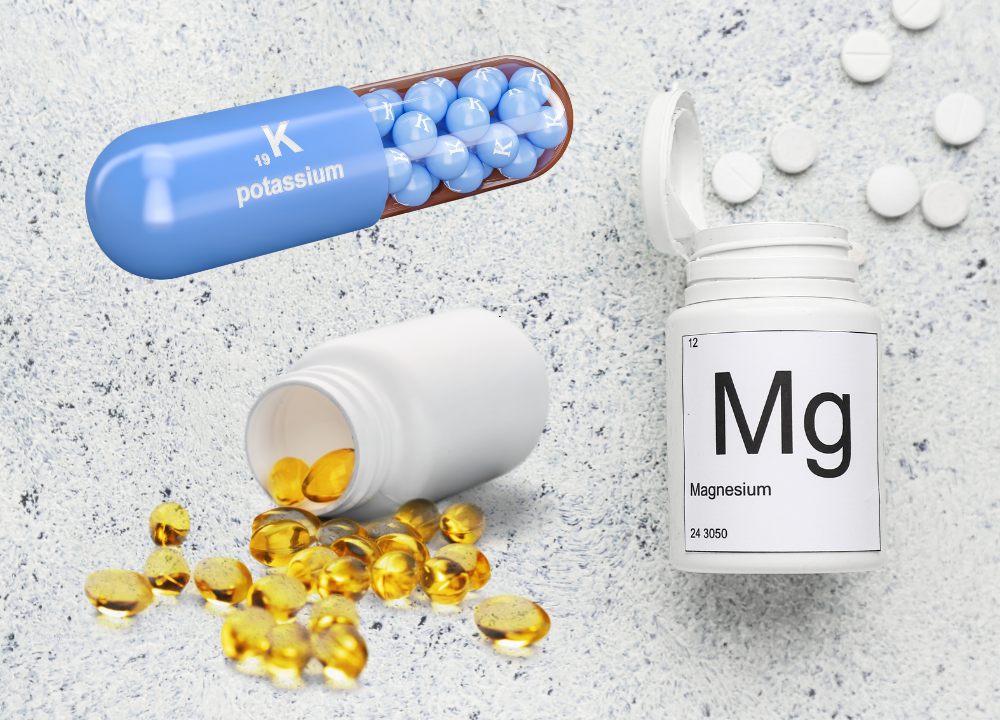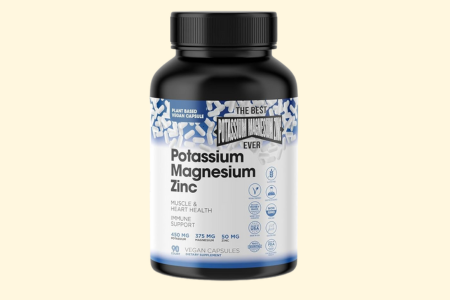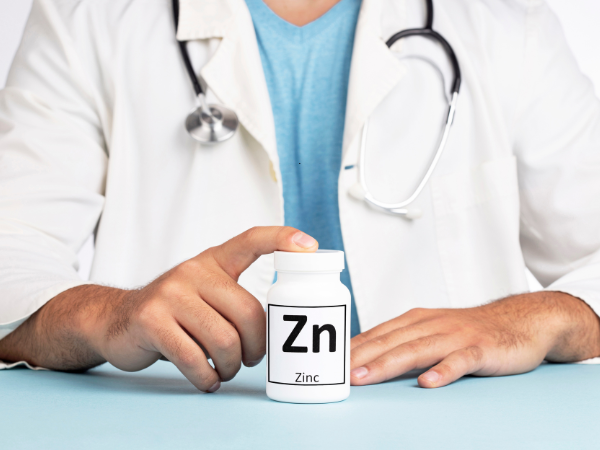
Magnesium, Potassium And Zinc: What Are They Used For & How They Benefit Your Health?
Magnesium, potassium, and zinc are vital minerals that play crucial roles in the human body. Magnesium helps with muscle and nerve function, protein synthesis, and blood sugar regulation. Potassium is essential for fluid balance, muscle contraction, and proper heart function. Zinc supports the immune system, wound healing, and DNA synthesis.
What Is Magnesium, Potassium and Zinc?
Understanding how each one benefits your body can help you make informed choices about your diet and supplements.
Understanding The Role Of Magnesium In The Body
Magnesium is an essential mineral involved in over 300 biochemical reactions in the body. It helps convert food into energy, supports muscle and nerve function, and maintains a healthy immune system.
Benefits of Magnesium:
- Energy Production: Magnesium helps convert carbohydrates, proteins, and fats into energy.
- Muscle Function: It helps muscles contract and relax properly.
- Nervous System: Magnesium regulates neurotransmitters, which send messages throughout the brain and nervous system.
- Bone Health: This mineral is crucial for bone formation and maintaining bone density.
A deficiency in magnesium can lead to muscle cramps, mental disorders, osteoporosis, and high blood pressure. Foods rich in magnesium include leafy greens, nuts, seeds, and whole grains.
The Importance Of Potassium For Health
Potassium is a key mineral that helps maintain fluid balance, muscle contractions, and nerve signals. It’s crucial for heart health and can help reduce blood pressure.
Benefits of Potassium:
- Fluid Balance: Potassium helps regulate fluid balance by working with sodium.
- Heart Health: It supports proper heart function by maintaining a regular heartbeat.
- Muscle Contractions: Potassium is vital for proper muscle contractions and preventing cramps.
- Nerve Function: This mineral helps send nerve impulses throughout your body.
A lack of potassium can cause weakness, fatigue, muscle cramps, and digestive problems. Foods high in potassium include bananas, oranges, spinach, and sweet potatoes.
Why Zinc Is Essential For Your Well-being
Zinc is a trace mineral that plays a significant role in immune function, protein synthesis, and DNA synthesis. It’s also important for wound healing and taste and smell.
Benefits of Zinc:
- Immune System: Zinc helps maintain a strong immune system by aiding in the production of immune cells.
- Protein Synthesis: It is crucial for protein synthesis and cell growth.
- DNA Synthesis: Zinc is necessary for DNA synthesis and cell division.
- Wound Healing: This mineral plays a role in wound healing and inflammation control.
Zinc deficiency can lead to weakened immunity, hair loss, and delayed wound healing. Foods rich in zinc include meat, shellfish, legumes, and seeds.
Supplements Magnesium Potassium Zinc for Vascular Health

Health Benefits Of Magnesium, Potassium and Zinc
Magnesium, potassium, and zinc essential minerals support various bodily functions, ensuring overall well-being. Let’s dive into the health benefits of each and understand how they contribute to our daily lives.
Magnesium Benefits: From Muscle Function To Mental Health
Magnesium is crucial for muscle function and mental health. It helps muscles relax and contract, preventing cramps and spasms. It also supports nerve function, ensuring proper communication between the brain and the body.
- Muscle Function: Magnesium plays a key role in muscle contraction and relaxation. It prevents muscle cramps and spasms.
- Nerve Function: It supports nerve function, ensuring proper communication between the brain and the body.
- Bone Health: Magnesium is essential for strong bones. It helps in the absorption of calcium, which is vital for bone density.
- Energy Production: Magnesium aids in converting food into energy, keeping you active and energetic throughout the day.
- Mental Health: It helps reduce symptoms of anxiety and depression. Magnesium also supports cognitive functions and memory.
| Health Benefit | Description |
|---|---|
| Muscle Function | Prevents cramps and spasms |
| Nerve Function | Ensures proper brain-body communication |
| Bone Health | Enhances calcium absorption |
| Energy Production | Converts food into energy |
| Mental Health | Reduces anxiety and depression |
Potassium Benefits: Regulating Heart Function And Blood Pressure
Potassium is vital for heart function and blood pressure regulation. It helps balance fluids in the body, ensuring proper hydration and electrolyte balance.
- Heart Function: Potassium supports heart health by maintaining a regular heartbeat. It reduces the risk of heart disease.
- Blood Pressure: Potassium helps lower blood pressure by counteracting the effects of sodium. It relaxes blood vessels.
- Fluid Balance: It regulates fluid balance, preventing dehydration and maintaining electrolyte levels.
- Muscle Function: Potassium aids muscle contractions. It prevents cramps and supports overall muscle health.
- Nerve Function: It ensures proper nerve function, facilitating communication between the brain and muscles.
| Health Benefit | Description |
|---|---|
| Heart Function | Maintains regular heartbeat |
| Blood Pressure | Lowers and regulates blood pressure |
| Fluid Balance | Prevents dehydration |
| Muscle Function | Prevents cramps |
| Nerve Function | Facilitates brain-muscle communication |
Zinc Benefits: Boosting Immunity And Wound Healing
Zinc is essential for boosting immunity and wound healing. It supports the body’s defense system, helping fight off illnesses and infections.
- Immune Support: Zinc strengthens the immune system. It helps produce and activate T-cells, which fight infections.
- Wound Healing: Zinc promotes faster wound healing. It aids in skin regeneration and repair.
- Growth and Development: Zinc is vital for cell growth and development, especially during pregnancy and childhood.
- DNA Synthesis: It plays a crucial role in DNA synthesis, ensuring proper cell division and function.
- Antioxidant Properties: Zinc protects cells from oxidative damage. It neutralizes harmful free radicals.
| Health Benefit | Description |
|---|---|
| Immune Support | Strengthens immune system |
| Wound Healing | Promotes skin regeneration |
| Growth and Development | Vital for cell growth |
| DNA Synthesis | Ensures proper cell division |
| Antioxidant Properties | Neutralizes free radicals |

Common Uses Of Magnesium, Potassium and Zinc Supplements
Magnesium, Potassium, and Zinc are essential minerals that support various bodily functions. They are vital for muscle function, nerve health, and the immune system. Many people take supplements to ensure they get enough of these nutrients.
When Should You Consider Taking Magnesium Supplements?
Magnesium is crucial for muscle and nerve function. It also helps regulate blood sugar levels. Consider taking magnesium supplements if you experience muscle cramps or spasms. Magnesium may also help with sleep issues and anxiety.
Common signs you need magnesium:
- Muscle cramps
- Fatigue
- Weakness
- Poor sleep
Benefits of magnesium supplements:
- Improves muscle function
- Reduces the risk of osteoporosis
- Helps manage blood pressure
- Supports heart health
People with certain conditions like diabetes or digestive issues may have lower magnesium levels. These individuals should consider magnesium supplements.
Who Needs Potassium Supplements The Most?
Potassium is key for heart and muscle health. It helps balance fluids and electrolytes in the body. Some people, especially those on certain medications, may have low potassium levels.
Common signs you need potassium:
- Muscle weakness
- Fatigue
- High blood pressure
- Irregular heartbeats
Benefits of potassium supplements:
- Supports heart health
- Helps manage blood pressure
- Reduces the risk of stroke
- Improves muscle function
People who sweat a lot, use diuretics, or have kidney issues may need potassium supplements. These supplements can help maintain the right balance of electrolytes in the body.
Zinc Supplements: Who Should Take Them And Why?
Zinc is essential for a healthy immune system. It also supports wound healing and DNA synthesis. Zinc supplements are beneficial for individuals with low zinc levels.
Common signs you need zinc:
- Frequent infections
- Slow wound healing
- Hair loss
- Loss of appetite
Benefits of zinc supplements:
- Boosts immune function
- Supports wound healing
- Improves skin health
- Enhances taste and smell
Vegetarians, pregnant women, and older adults may need zinc supplements. These groups are more likely to have low zinc levels.
Magnesium, Potassium and Zinc Supplement Analogues
Sometimes, food sources may not provide enough of these nutrients, making Magnesium, Potassium, and Zinc supplement analogues essential for maintaining optimal health.
Natural Sources Of Magnesium, Potassium, And Zinc
Consuming foods rich in Magnesium, Potassium, and Zinc can help you meet your daily requirements. Here are some natural sources:
- Magnesium:
- Spinach
- Almonds
- Avocados
- Black Beans
- Potassium:
- Bananas
- Sweet Potatoes
- Oranges
- Tomatoes
- Zinc:
- Oysters
- Beef
- Pumpkin Seeds
- Chickpeas
Here’s a table summarizing the primary sources:
| Mineral | Food Sources |
|---|---|
| Magnesium | Spinach, Almonds, Avocados, Black Beans |
| Potassium | Bananas, Sweet Potatoes, Oranges, Tomatoes |
| Zinc | Oysters, Beef, Pumpkin Seeds, Chickpeas |
Alternative Supplements To Magnesium, Potassium, And Zinc
For those unable to get enough of these minerals from food, supplements are a great option. Here are some alternatives:
- Magnesium Supplements:
- Magnesium Citrate – Easy to absorb
- Magnesium Oxide – High magnesium content
- Magnesium Chloride – Best for digestion issues
- Potassium Supplements:
- Potassium Chloride – Common and effective
- Potassium Gluconate – Gentle on the stomach
- Potassium Citrate – Helps prevent kidney stones
- Zinc Supplements:
- Zinc Gluconate – Common cold remedy
- Zinc Picolinate – Easily absorbed
- Zinc Acetate – Boosts immunity
Choosing the right supplement depends on your specific needs and health conditions. Always consult with a healthcare provider before starting any supplement regimen.
What is Vitamin C as Calcium, Potassium, Magnesium, and Zinc Ascorbate?
Vitamin C as ascorbate combines these minerals for better absorption and provides antioxidant support, along with benefits for bone, heart, and immune health.
What foods are rich in calcium, magnesium, potassium, and zinc?
Foods like leafy greens, nuts, seeds, dairy, fish, bananas, and whole grains are rich in calcium, magnesium, potassium, and zinc.
Can I take magnesium, potassium, and zinc together?
Yes, you can take them together. They complement each other and support various body functions, but consult a healthcare provider for proper dosages.




